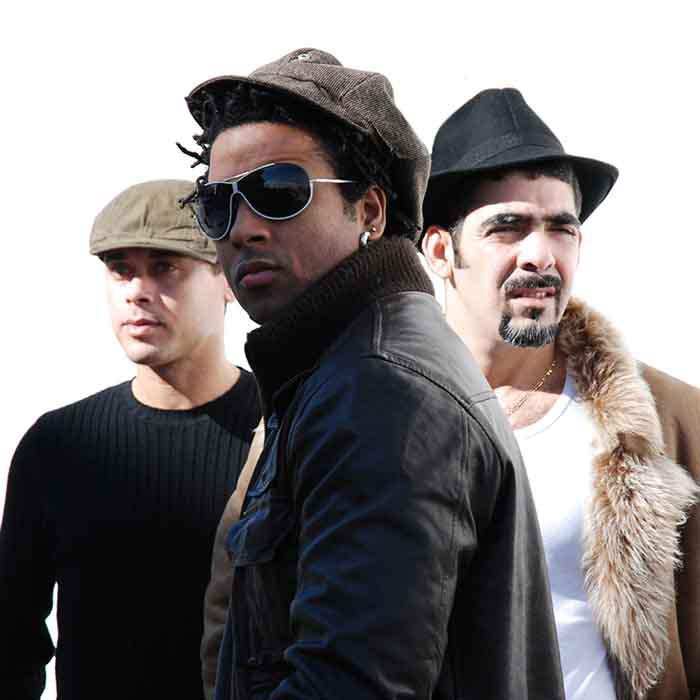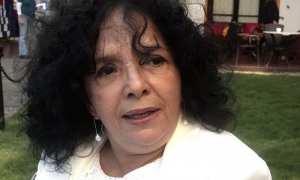
After an eight year absence, hundreds of packed concerts around the world, five albums, eight Grammy nominations and two awards, confirming them as Cuba's most successful rap group to date, Orishas decided to revive their legacy, shocking the Cuban urban music scene with news of their return to the international stage. The group already has 40 concerts lined up around the world and is set to headline various prominent music festivals.
Yotuel Romero was responsible for Orishas' return at a time when hardly anyone expected to see the band on stage again. "After the split we each went our own way as soloists and every time I got on stage I felt like I was missing something. Ever since I started out in the music world Ruzzo has been by my side. I missed them a lot and I wanted to link up with them again. On the other hand, many people on social media, which didn’t exist in the early days of Orishas, were asking us when we were going to get back together which also motivated us to reform. I genuinely missed Roldán, Ruzzo, our sound, the fans that requested our music," Yotuel told Granma, seated alongside Hiram Riverí Medina (Ruzzo) and Roldán González Rivero.
Why did you decide to return after eight years?

—Roldán: For us it was a longstanding need to do our bit for Cuban music. We didn’t just return because of public demand but also for ourselves. It was a shame that the group had split. Our return was natural, spontaneous. Yotuel called me and Ruzzo up to propose we reform the group and here we are. A band is like a marriage, there is always tension, clashes, but friendship often wins out, just as in our case.
We all thought it would be a shame if Orishas ended. And today we continue to represent our country in the way we think it should be done.
Aren't you afraid the public won't receive you the same way they did eight years ago?
—Yotuel: The good thing about Orishas is that we were never a group that tried to make hits or get on the radio to launch our international career. Orishas made music from the heart and soul and the public really took to our songs. For example, what's happening right now with new shows is amazing. We already have 40 dates around the world. We're going to play with Iggy Pop, with Lenny Kravitz in Argentina, with Joss Stone in Belgium. We are headlining Bogota's Stereo Picnic festival alongside Radiohead. In regards to the group we remain faithful to our urban poetry, our lyrics, our Cuban rap and the island's musical tradition, which is why we have faith that our fans will receive us with open arms.
Many stories exist about the birth of Orishas in Paris. Can you explain exactly what happened?
—Yotuel: We formed the group Amenaza and at that time we were pretty crazy. When I told my mother that I was going to Paris with Ruzzo to make Cuban rap, she didn’t understand. We had a really hard time over there, we didn’t speak French, the person that brought us over tricked us and we had to sleep in the subway station. We asked for help from friends. They were rough times.
—Ruzzo: There are two sides to Paris. We weren’t living in the city of lights, but the city of shadows, for long enough not to want to repeat the experience. But we learned to survive in basements, to sleep wherever the night took you. Roldán kind of saved us from our situation.
Given that situation, how did you react to the success of A lo cubano, which sold over 200,000 copies?
—Roldán: It was a very spontaneous project. We wanted to give it Cuban identity. We didn’t know what would happen. Suddenly we found ourselves in a studio with three contracts and we didn’t know where to put the pen. It was incredible how everything suddenly turned around for us. We signed a contract but maintained the musical freedom we were looking for. This was very important because Orishas isn’t a band, it’s a laboratory and that’s why it works. Yotuel writes what he wants; Ruzzo says what he wants and I sing what I feel.
—Yotuel: When we came out in 1999 the Grammys didn’t have an urban music category. But they had to create one following our albums A lo cubano and especially Emigrante, which won aGrammy Award. An incredible Latin music movement emerged after Orishas blew up.
What happened to the band after your Grammy nominations and win?
—Yotuel: Orishas won the Grammy in 2003 and at that time blockade restrictions on Cuban musicians were very harsh. Back then a Cuban rapper winning a Grammy was almost impossible, but very important. And surprisingly the only time they allowed us to perform at the ceremony was eight years after we won the award. This award was worth 100 times more given everything it meant for Cuban rap.
Some rappers have criticized you because they believe that you lost your commitment to the underground scene, which defined Amenaza, the forerunner to Orishas…
—Ruzzo: The fact is that the lack of information at the time meant that you fell into misconceptions like that. Then, the idea that Cuban rap was created to be underground was a mistaken concept, which we also experienced. Later we got hold of more information. However, despite having achieved global success, we were born in Cuba's underground music scene and will forever represent it. Some rappers eventually understood, others maintain their position. In any case, directly or indirectly, we were able to open a door that was previously closed to Cuban rap.
Can you describe the underground scene in which Amenaza was born?
—Ruzzo: The old groups used to prepare well in advance before going up to perform on stage, which would take place in the Café Cantante, one of the first regular rap events created thanks to Gerardo Alfonso, who worked hard to provide our movement with a space. There, both male and female rappers would come together.
—Yotuel: At that time rap came from the new trova movement. Groups would create really good lyrics, it was art from the streets. Nowadays some rappers' lyrics are more direct, but that’s where you lose the ability to discover different meanings and allow each person to interpret the song in their own way.
—Ruzzo: This way the songs became eternal.
Did you maintain links with Cuba as you gained greater success?
—Yotuel: We have always had good relations with our country. For example, we have received full support from Cuban music institutions with our return. This is the first time Orishas is launching itself from Havana. We recorded the track "Cuba, Isla Bella," here with Cuban musicians and producers. It's important to know where you come from and when things get rough we return to the island, our families, we eat roast pork, drink rum and play dominos with friends.
After a long absence Cubans were finally able to see you perform live in the Peace Without Borders concert…
—Yotuel: The saddest and loveliest thing for Orishas was that we were going to have the opportunity to play before so many Cubans for the first time, but it was also the last time we would perform as a group in Cuba. We already knew we were going to split, but we didn’t say so because we didn’t want it to affect the concert. We participated in the show and after 12 years of struggle and hard work we bid farewell as a band to the Cuban people. But we finally reformed because a leopard never changes his spots.
Why did the group split?
—Yotuel: Orishas split because we were young guys that all started to grow. We began to get involved with different musical movements, listen to different music and we were exhausted from all the touring. Also, we weren’t mature enough to understand what we were achieving with Orishas. In 2009 we realized that our musical tastes were changing and we decided to end the project at a beautiful moment to allow each of us to develop their own creative vision.
Unlike the 90s, Cuban rappers today no longer have the emblematic festivals held in Alamar, where Amenaza was born…
—Ruzzo: This is our job now, to revive spaces like this, something we must do with great dedication and support.
Is there a new album on the way?
—Yotuel: We are currently putting together a live album which we recorded in Callejón de Hamel and will be called Orishas, el reencuentro. It will have 15 tracks and feature15 guest artists. We'll have to choose 10 tracks from our existing repertory and five new ones. It'll be hard work but will include "El kilo," "Antidiótico," "A lo cubano," "Ausencia."
What are your plans for the coming months?
—Yotuel: We wrote the single "Cuba, isla bella," which we liked a lot so we released it. Now we are going to reconnect with our public and those unfamiliar with the group. Changes are also underway in Cuba and we are going to capture this reality in songs as we are closer to the island than ever before. In fact we are scheduled to perform 10 concerts in Cuba in February as part of a national tour. Meanwhile, I would like to help see other groups like Orishas emerge on the island and see rappers achieve success and write songs which talk about their reality with frankness and respect.






